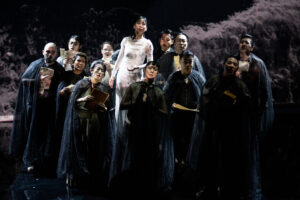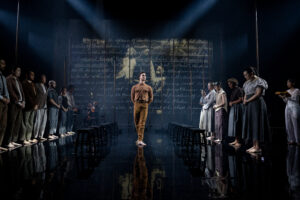
The special sauce that has made Prototype, the annual opera/theater festival, a success for over a decade is a straightforward formula: socially relevant, edgy vocal works that are high on drama. Angel Island, a theatrical work with music by Huang Ruo, fits that description.
The speck of land in the middle of San Francisco Bay known as Angel Island served as an immigration port in the first half of the 20th century
. Hundreds of thousands of hopeful migrants from Asia were interrogated and detained, some of them for years, in the decades from 1910 to 1940. It’s not a great leap of imagination to relate today to this story of migration, discrimination, prejudice and downright hatred of certain citizens from abroad.
These immigrants came here of their own volition, but did they have any idea of the strife that awaited them as they stepped off the boat? Like so many Americans whose families came from abroad over the past four centuries, they were only looking for a better life. The promise of streets paved with gold (especially after word of the 1849 Gold Rush spread) was tantalizing.
The Chinese-American violist Charlton Lee, a member of the Del Sol Quartet suggested the story to the Chinese-born composer Huang Ruo. In a New York Times article, Lee said that many people “don’t know about the plight of these immigrants who were trying to come here, start a new life and were just stuck.”
The work is in eight movements, alternating between narration and singing. The text for the sung portions were taken from some of the 200 poems that were found in the barracks on Angel Island, etched into the walls by the detainees. Each narrated section consisted of text taken directly from news accounts and other historical texts, depicting the Chinese Massacre of 1871, The Page Act of 1875 (legislation denying Chinese women entry to the United States), and the story of the lone Chinese survivor of the Titanic.
The Del Sol Quartet performed the score on stage, along with members of the Choir of Trinity Wall Street whose acting talents were employed throughout the performance. The instrumental parts were often intensely rhythmic and emphatic chords, which were dramatic but sometimes monotonous. There wasn’t much in the way of melody for the instrumentalists or the singers, but the harmonies were lushly gorgeous and beautifully sung, belying the darkness and trauma of the texts. Bill Morrison’s film, often with images of the ocean, was mesmerizing, especially when the choir huddled together and swayed as if on an undulating boat at sea.

In general, each element of the production on its own wasn’t exciting — but when combined, the hypnotic film, the adagio movements of the singers clustered on stage as directed by Matthew Ozawa, and the rather minimalist music — all worked together to be incredibly effective. This is a work much greater than the sum of its parts. Dramatic peaks, such as sequences with two solo dancers, and the insistent sounding of a gong throughout the final movement were that much more compelling in contrast.
Angel Island brings attention to a story of United States immigration that is much less familiar than the Statue of Liberty-adjacent Ellis Island.
The New York premiere of Angel Island was performed at the Harvey Theater at BAM Strong on January 11-13, 2024 (I attended on January 12). It was produced by Beth Morrison Projects in association with Brooklyn Academy of Music.
